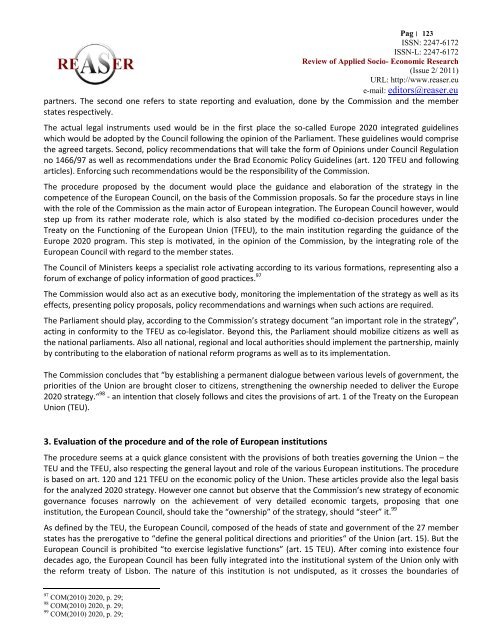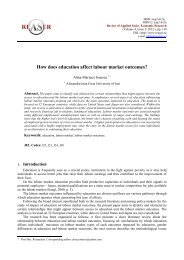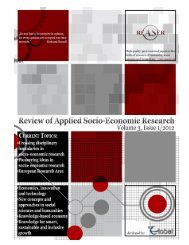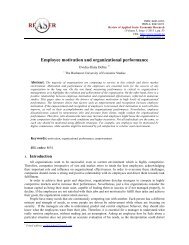Volume 2, ISSUE2/2011 - Review of Applied Socio-Economic ...
Volume 2, ISSUE2/2011 - Review of Applied Socio-Economic ...
Volume 2, ISSUE2/2011 - Review of Applied Socio-Economic ...
Create successful ePaper yourself
Turn your PDF publications into a flip-book with our unique Google optimized e-Paper software.
Pag׀ 123 ISSN: 2247-6172ISSN-L: 2247-6172<strong>Review</strong> <strong>of</strong> <strong>Applied</strong> <strong>Socio</strong>- <strong>Economic</strong> Research(Issue 2/ <strong>2011</strong>)URL: http://www.reaser.eue-mail: editors@reaser.eupartners. The second one refers to state reporting and evaluation, done by the Commission and the memberstates respectively.The actual legal instruments used would be in the first place the so-called Europe 2020 integrated guidelineswhich would be adopted by the Council following the opinion <strong>of</strong> the Parliament. These guidelines would comprisethe agreed targets. Second, policy recommendations that will take the form <strong>of</strong> Opinions under Council Regulationno 1466/97 as well as recommendations under the Brad <strong>Economic</strong> Policy Guidelines (art. 120 TFEU and followingarticles). Enforcing such recommendations would be the responsibility <strong>of</strong> the Commission.The procedure proposed by the document would place the guidance and elaboration <strong>of</strong> the strategy in thecompetence <strong>of</strong> the European Council, on the basis <strong>of</strong> the Commission proposals. So far the procedure stays in linewith the role <strong>of</strong> the Commission as the main actor <strong>of</strong> European integration. The European Council however, wouldstep up from its rather moderate role, which is also stated by the modified co-decision procedures under theTreaty on the Functioning <strong>of</strong> the European Union (TFEU), to the main institution regarding the guidance <strong>of</strong> theEurope 2020 program. This step is motivated, in the opinion <strong>of</strong> the Commission, by the integrating role <strong>of</strong> theEuropean Council with regard to the member states.The Council <strong>of</strong> Ministers keeps a specialist role activating according to its various formations, representing also aforum <strong>of</strong> exchange <strong>of</strong> policy information <strong>of</strong> good practices. 97The Commission would also act as an executive body, monitoring the implementation <strong>of</strong> the strategy as well as itseffects, presenting policy proposals, policy recommendations and warnings when such actions are required.The Parliament should play, according to the Commission’s strategy document “an important role in the strategy”,acting in conformity to the TFEU as co-legislator. Beyond this, the Parliament should mobilize citizens as well asthe national parliaments. Also all national, regional and local authorities should implement the partnership, mainlyby contributing to the elaboration <strong>of</strong> national reform programs as well as to its implementation.The Commission concludes that “by establishing a permanent dialogue between various levels <strong>of</strong> government, thepriorities <strong>of</strong> the Union are brought closer to citizens, strengthening the ownership needed to deliver the Europe2020 strategy.“ 98 - an intention that closely follows and cites the provisions <strong>of</strong> art. 1 <strong>of</strong> the Treaty on the EuropeanUnion (TEU).3. Evaluation <strong>of</strong> the procedure and <strong>of</strong> the role <strong>of</strong> European institutionsThe procedure seems at a quick glance consistent with the provisions <strong>of</strong> both treaties governing the Union – theTEU and the TFEU, also respecting the general layout and role <strong>of</strong> the various European institutions. The procedureis based on art. 120 and 121 TFEU on the economic policy <strong>of</strong> the Union. These articles provide also the legal basisfor the analyzed 2020 strategy. However one cannot but observe that the Commission’s new strategy <strong>of</strong> economicgovernance focuses narrowly on the achievement <strong>of</strong> very detailed economic targets, proposing that oneinstitution, the European Council, should take the “ownership” <strong>of</strong> the strategy, should “steer” it. 99As defined by the TEU, the European Council, composed <strong>of</strong> the heads <strong>of</strong> state and government <strong>of</strong> the 27 memberstates has the prerogative to “define the general political directions and priorities“ <strong>of</strong> the Union (art. 15). But theEuropean Council is prohibited “to exercise legislative functions” (art. 15 TEU). After coming into existence fourdecades ago, the European Council has been fully integrated into the institutional system <strong>of</strong> the Union only withthe reform treaty <strong>of</strong> Lisbon. The nature <strong>of</strong> this institution is not undisputed, as it crosses the boundaries <strong>of</strong>97 COM(2010) 2020, p. 29;98 COM(2010) 2020, p. 29;99 COM(2010) 2020, p. 29;








